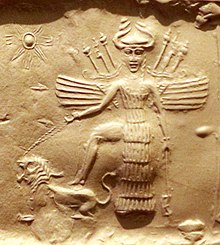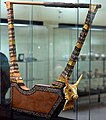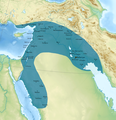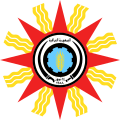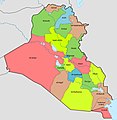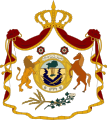
Back بوابة:العراق Arabic প্রবেশদ্বার:ইরাক Bengali/Bangla دەروازە:عێراق CKB Portal:Irak Spanish Portail:Irak French Portal:Iraq Malay Portal:Iraque Portuguese Портал:Ирак Russian Portal:Irak Turkish باب:عراق Urdu
The Iraq PortalA view of Baghdad, Iraq
Iraq, officially the Republic of Iraq, is a country in West Asia and in the geopolitical region known as the Middle East. With a population of over 46 million, it is the 30th-most populous country. It is a federal parliamentary republic that consists of 18 governorates. Iraq is bordered by Turkey to the north, Iran to the east, the Persian Gulf and Kuwait to the southeast, Saudi Arabia to the south, Jordan to the southwest, and Syria to the west. The capital and largest city is Baghdad. Iraqi people are diverse; mostly Arabs, as well as Kurds, Turkmen, Assyrians, Armenians, Yazidis, Mandaeans, Persians and Shabakis with similarly diverse geography and wildlife. Most Iraqis are Muslims – minority faiths include Christianity, Yazidism, Mandaeism, Yarsanism and Zoroastrianism. The official languages of Iraq are Arabic and Kurdish; others also recognized in specific regions are Turkish, Suret, and Armenian. Modern Iraq dates back to 1920, when a Mandate was established, followed by a British-backed monarchy under Faisal. The Hashemite Kingdom declared its independence in 1932. A revolution led by General Qasim, overthrew the monarchy and declared a republican Iraq and later ruled by brothers Abdul Salam Arif and Abdul Rahman Arif. The Ba'athist government took control, first led by Ahmed Hassan al-Bakr and then by Saddam Hussein from 1968 to 2003. Throughout the period, Iraq fought the Iran–Iraq War and the Gulf War. In 2003, a U.S.-led coalition force invaded and occupied Iraq and inititated a war, which overthrew Saddam's government. The war continued with an insurgency and sectarian civil war. The U.S. troops began to withdraw and war officially ended in 2011. The subsequent continuing repression and sectarian policies of Nouri al-Maliki's government caused protests, after which a coalition of Ba'athist and Sunni militias took up arms during a campaign. The climax of the campaign was the offensive by the ISIS that marked its rapid territorial expansion, prompting the return of American troops to fight the war, which lasted until 2017. Iran has also intervened since 2014, expanding its influence through sectarian parties and Khomeinist militia groups, triggering widespread protests. Post-war conflicts continues today. (Full article...) Selected article -Inanna is the ancient Mesopotamian goddess of love, war, and fertility. She is also associated with sensuality, procreation, divine law, and political power. Originally worshipped in Sumer, she was known by the Akkadian Empire, Babylonians, and Assyrians as Ishtar (and occasionally the logogram 𒌋𒁯). Her primary title is "the Queen of Heaven". She was the patron goddess of the Eanna temple at the city of Uruk, her early main cult center. In archaic Uruk she was worshipped in three forms: morning Inanna (Inana-UD/hud), evening Inanna (Inanna sig) and princely Inanna (Inanna NUN), the former two reflecting the phases of her associated planet Venus. Her most prominent symbols include the lion and the eight-pointed star. Her husband is the god Dumuzid (later known as Tammuz), and her sukkal (attendant) is the goddess Ninshubur, later conflated with the male deities Ilabrat and Papsukkal. (Full article...)Selected picture
Old building in Nineveh Did you know...
Selected biography - Sargon II (Neo-Assyrian Akkadian: 𒈗𒁺, romanized: Šarru-kīn, meaning "the faithful king" or "the legitimate king") was the king of the Neo-Assyrian Empire from 722 BC to his death in battle in 705. Probably the son of Tiglath-Pileser III (r. 745–727), Sargon is generally believed to have become king after overthrowing Shalmaneser V (r. 727–722), probably his brother. He is typically considered the founder of a new dynastic line, the Sargonid dynasty. Modelling his reign on the legends of the ancient rulers Sargon of Akkad, from whom Sargon II likely took his regnal name, and Gilgamesh, Sargon aspired to conquer the known world, initiate a golden age and a new world order, and be remembered and revered by future generations. Over the course of his seventeen-year reign, Sargon substantially expanded Assyrian territory and enacted important political and military reforms. An accomplished warrior-king and military strategist, Sargon personally led his troops into battle. By the end of his reign, all of his major enemies and rivals had been either defeated or pacified. Among Sargon's greatest accomplishments were the stabilization of Assyrian control over the Levant, the weakening of the northern kingdom of Urartu, and the reconquest of Babylonia. From 717 to 707, Sargon constructed a new Assyrian capital named after himself, Dur-Sharrukin ('Fort Sargon'), which he made his official residence in 706. (Full article...)
General imagesThe following are images from various Iraq-related articles on Wikipedia.
ListsTopicsCategoriesRelated portalsReligions in Iraq Arab states Other countries WikiProjectsThings you can do
Associated WikimediaThe following Wikimedia Foundation sister projects provide more on this subject:
Discover Wikipedia using portals | ||||||||
© MMXXIII Rich X Search. We shall prevail. All rights reserved. Rich X Search




